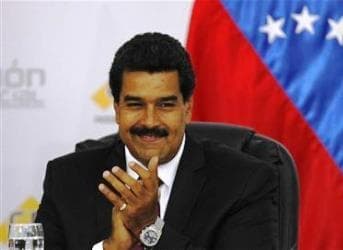To say that U.S. relations with Venezuela’s former President Hugo Rafael Chávez grew increasingly strained would be an understatement. But Chávez succumbed to cancer on 5 March, and the winds of change are blowing through Caracas.
Why was Chávez in Washington’s bad books? His choice of allies, which included the Russian Federation, Iran and Cuba, but worse still were the social programs that Chávez implemented to benefit his people, which were socialist in nature, anathema to Washington’s proscriptions.
But, tying the U.S. and Venezuela together like Siamese twins is – oil. According to the U.S. Energy Administration, Venezuela is the fourth largest provider of crude oil imports to the U.S., averaging 930 thousand barrels per day. In its country report on Venezuela the EIA succinctly noted, “Venezuela contains some of the largest oil and natural gas reserves in the world. It consistently ranks as one of the top suppliers of oil to the U.S. Venezuela is one of the world's largest exporters of crude oil and the largest in the Western Hemisphere. The oil sector is of central importance to the Venezuelan economy. As a founding member of the Organization of the Petroleum Exporting Countries (OPEC), Venezuela is an important player in the global oil market.”
Venezuela has the largest conventional oil reserves and the second-largest natural gas reserves in the Western Hemisphere and two years ago OPEC reported that of the organization’s 81.33 percent of the globe’s known oil reserves Venezuela had 24.8 percent, exceeding Saudi Arabia with 22.2 percent. According to state oil company Petróleos de Venezuela, S.A. (PDVSA) figures, Venezuela currently has 77.5 billion barrels of oil reserves, the largest in the Western Hemisphere. PDVSA has a production capacity, including its strategic associations and operating agreements, of 4 million barrels per day, the highest production capacity in the Western Hemisphere.
To fund his social programs, Chávez was determined to bring the country’s oil sector under government control, putting him into direct conflict with Washington’s belief in free markets.
Related article: How Would the World Change if the International Energy Trade Transformed?
Venezuela’s oil industry had been under private control until 1974, when Venezuela nationalized it, setting up PDVSA. Venezuela’s oil production is centered in the Orinoco Oil Belt, which analysts believe contains the world’s largest reserves of extra-heavy oil, with an estimated 300 billion recoverable barrels. In the 1990s PDVSA began a so-called “oil opening,” where it allowed more and more foreign private companies to extract oil, via majority shares in joint ventures and the operating agreements.
But difficulties began with Washington in February 2007, when Chávez announced a new law to nationalize the last remaining oil production sites that are under foreign company control, to take effect on 1 May. Under the law, which allowed foreign companies to negotiate the nationalization terms, earlier joint ventures, involving ExxonMobil, ChevronTexaco, Statoil, ConocoPhillips, and BP, were transformed to give PDVSA a minimum 60 percent stake. The process completed a government initiative begun in 2005, when the Chavez administration transformed earlier “operating agreements” in Venezuela’s older oil fields into joint ventures with a wide variety of foreign companies. Thirty out of 32 such operating agreements were transformed, with most foreign companies accepting the new arrangements, but ExxonMobil and ConocoPhillips refused, instituting lawsuits for compensation that continue to this day.
The policies had repercussions in the diplomatic sphere. On 28 June 2010 President Obama nominated Palmer as U.S. Ambassador to Venezuela but three months later Chávez announced on his weekly TV program that he would not allow Larry Palmer to take up his post after Palmer told a US senator that morale in the Venezuelan army was low and that members of Chávez's government had ties to leftist FARC Colombian rebels. On 28 December Chávez flatly refused to accept Palmer because of his derogatory remarks and the following day the U.S. revoked the accreditation of Venezuelan ambassador, Bernardo Álvarez Herrera.
And there relations have remained until now, even as oil sales have continued unabated.
Related article: Brazil’s Petrobras Sells $11 Billion in Debt Bonds
But Venezuela's new President, Nicolás Maduro, is now seeking to break the diplomatic logjam. On 19 May, during an interview with Venezuela’s Televen television channel, Foreign Minister Elias Jaua said, "We are going to remain open to normalizing relations with the United States. The first thing would be to resume diplomatic representation at the highest level," adding that Venezuela is "interested in further deepening and cultivating a friendship with the U.S. people."
ADVERTISEMENT
To be sure, there are still many roadblocks in the way – quite aside from the rhetorical sniping, the U.S. has yet to recognize Maduro’s election, and there remains that pesky issue of compensation. But an olive branch has been extended, and Washington can lose little by at least listening to the country with the Western Hemisphere’s largest energy reserves. If they do not, then Caracas always has China, which is interested in trade more than ideological rhetoric.
By. John C.K. Daly of Oilprice.com



















4 million? Nonsense! They haven't come close to that number in 20 years. They do between 2.3 and 2.7 MBD today,.....max! Sixteen years ago it was 3.3 MBD.
"But an olive branch has been extended, ..."
Really? An olive branch? Maduro? Venezuela is in the process of shifting most of their oil production capacity from the US Gulf Coast to China and India. Never underestimate the stupidity of Nicolas Maduro and his band of Chavinistas. There is no olive branch, never was.